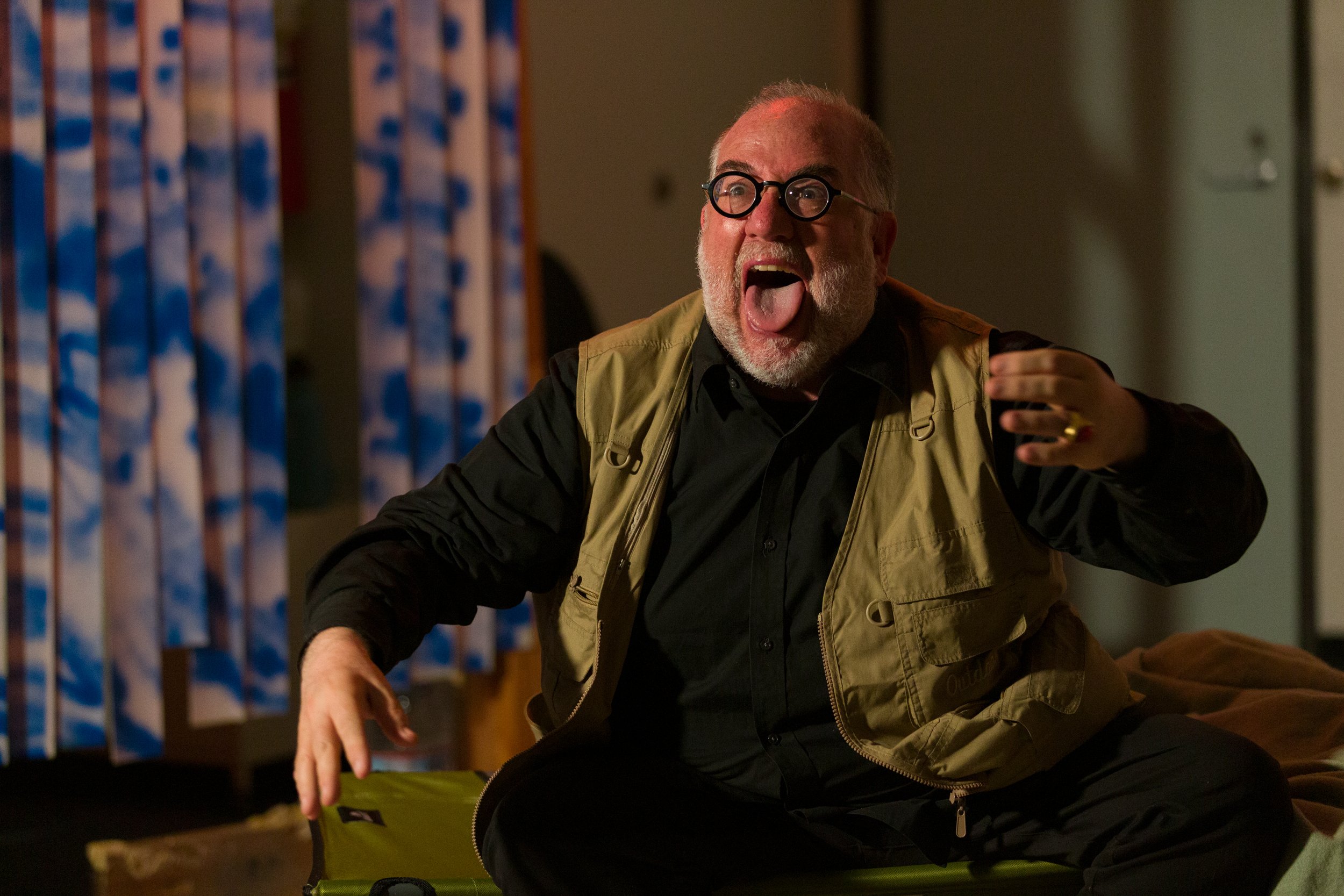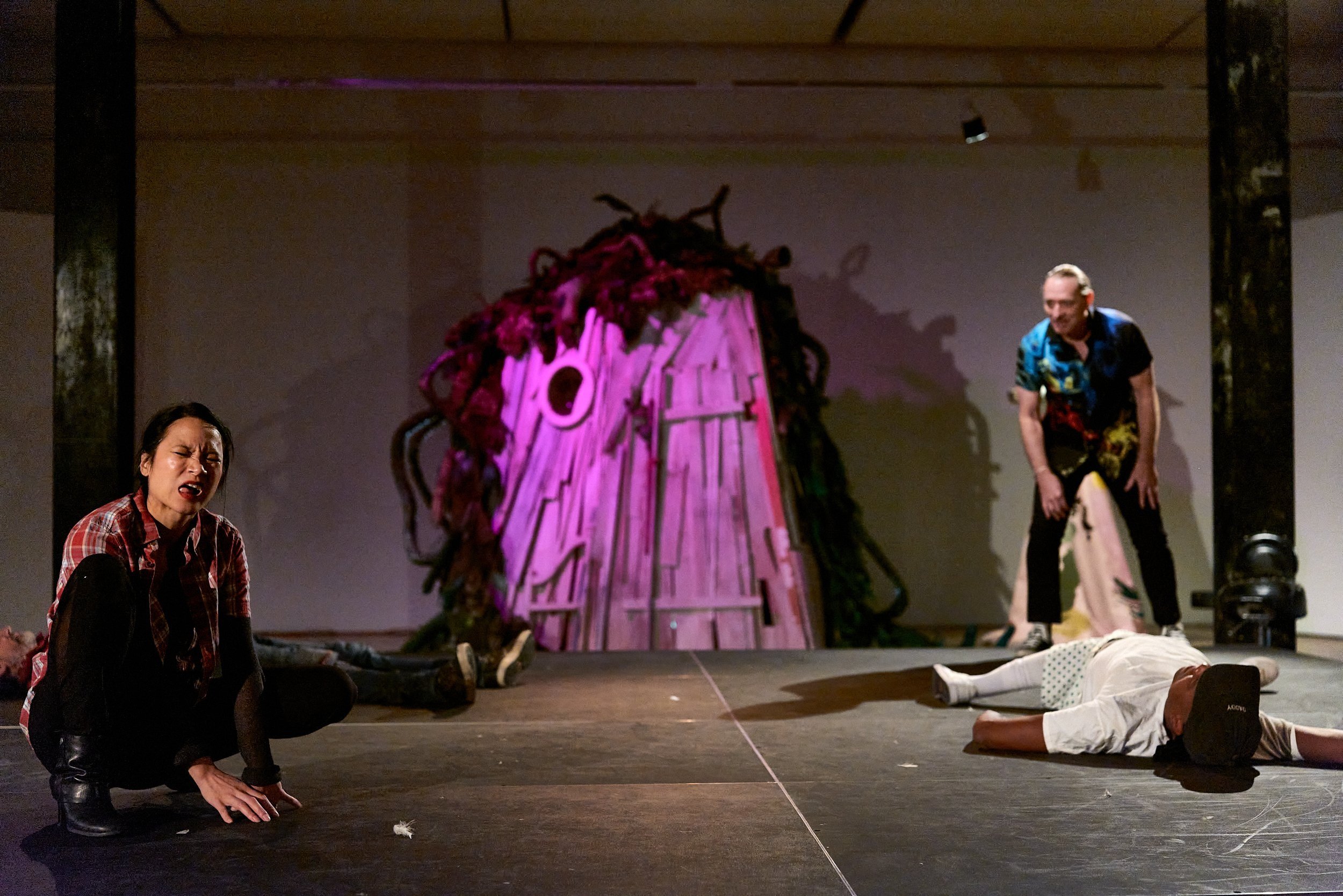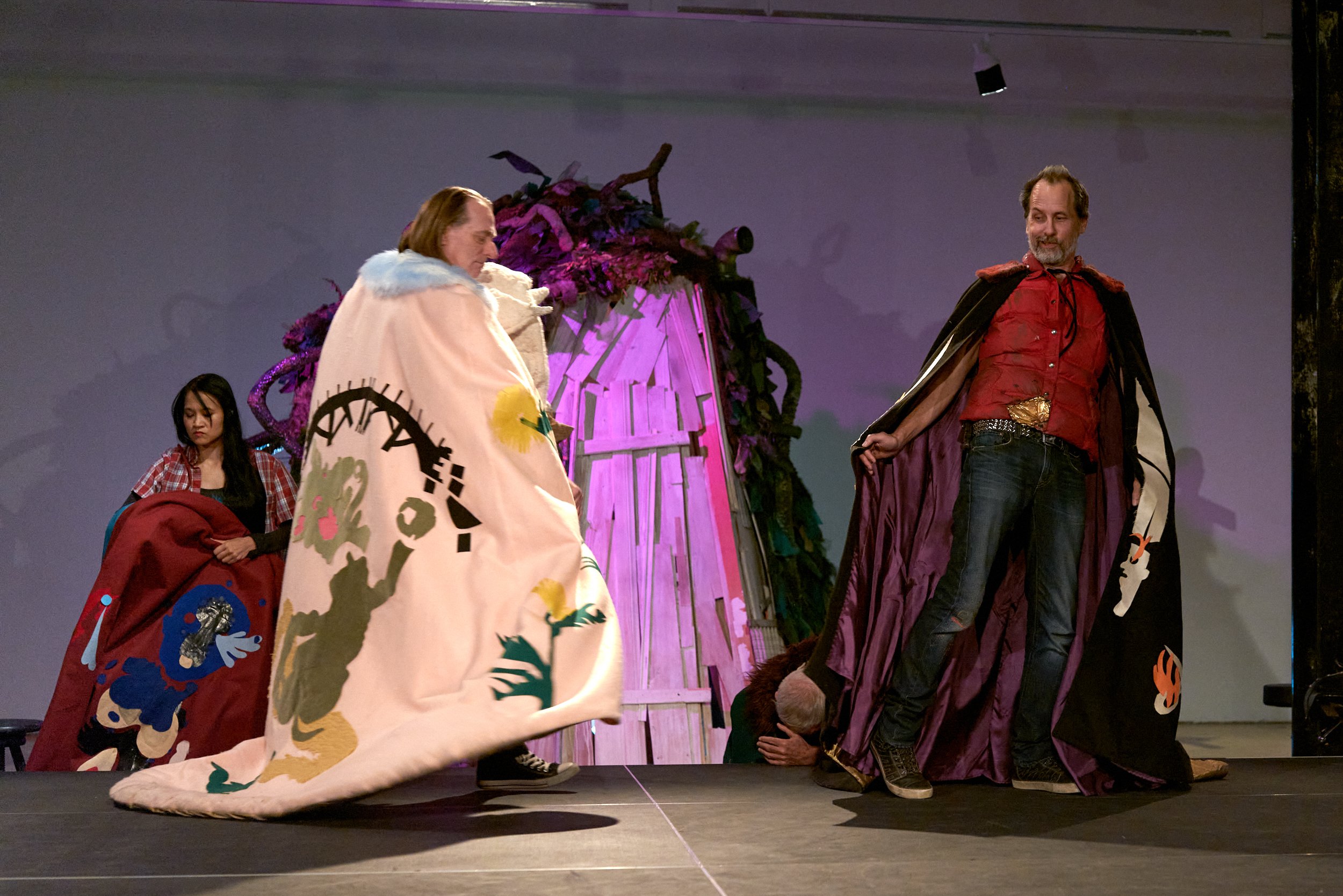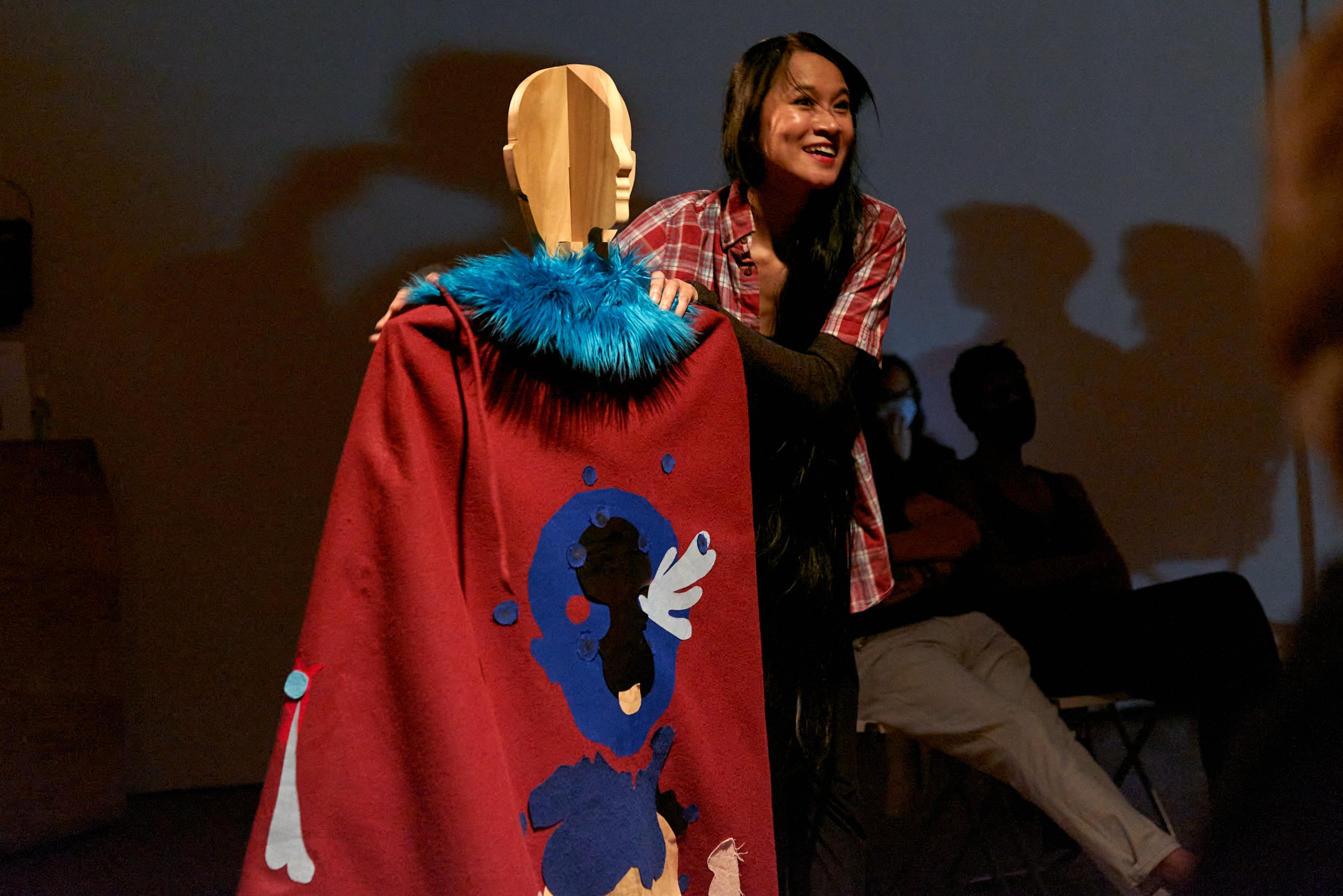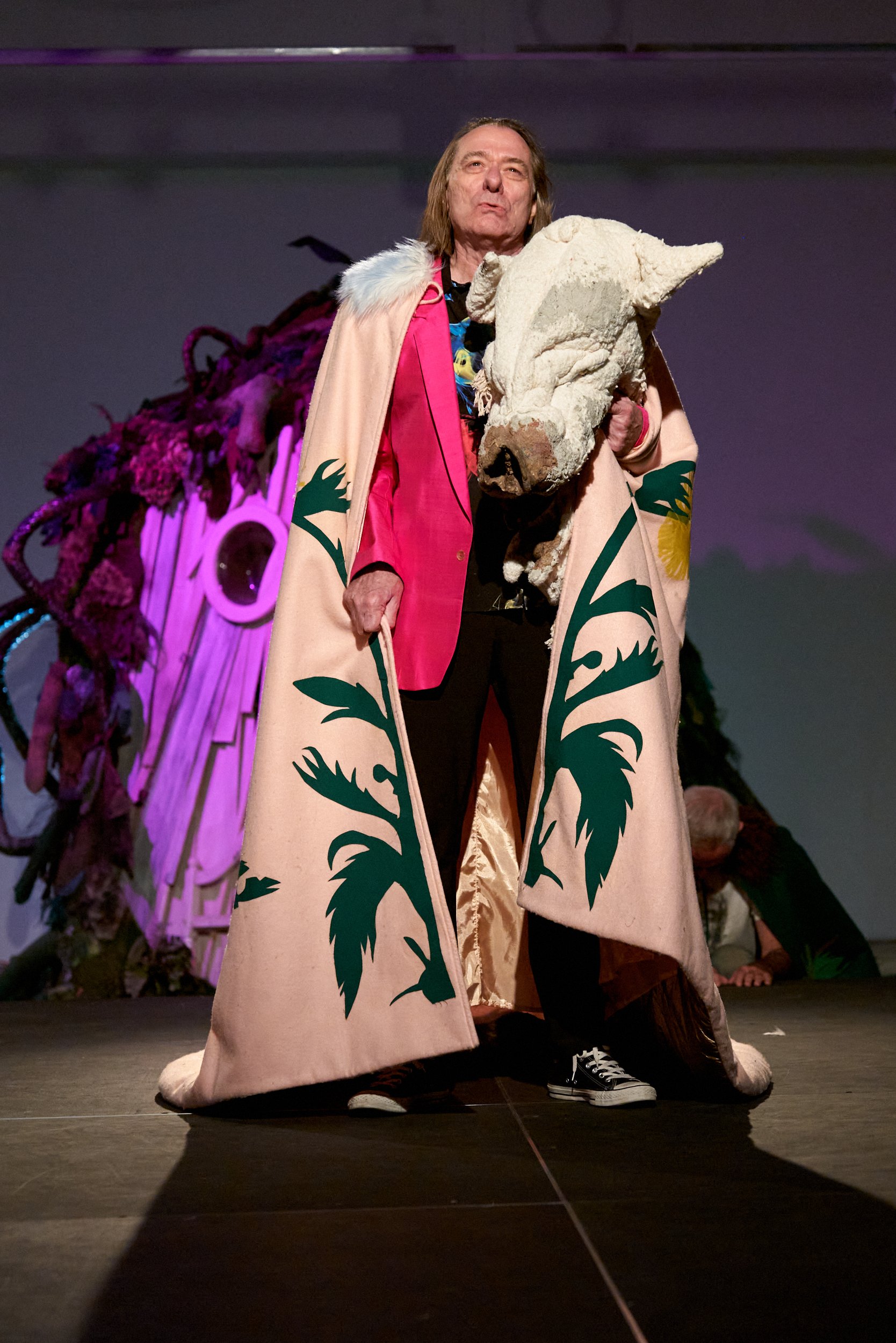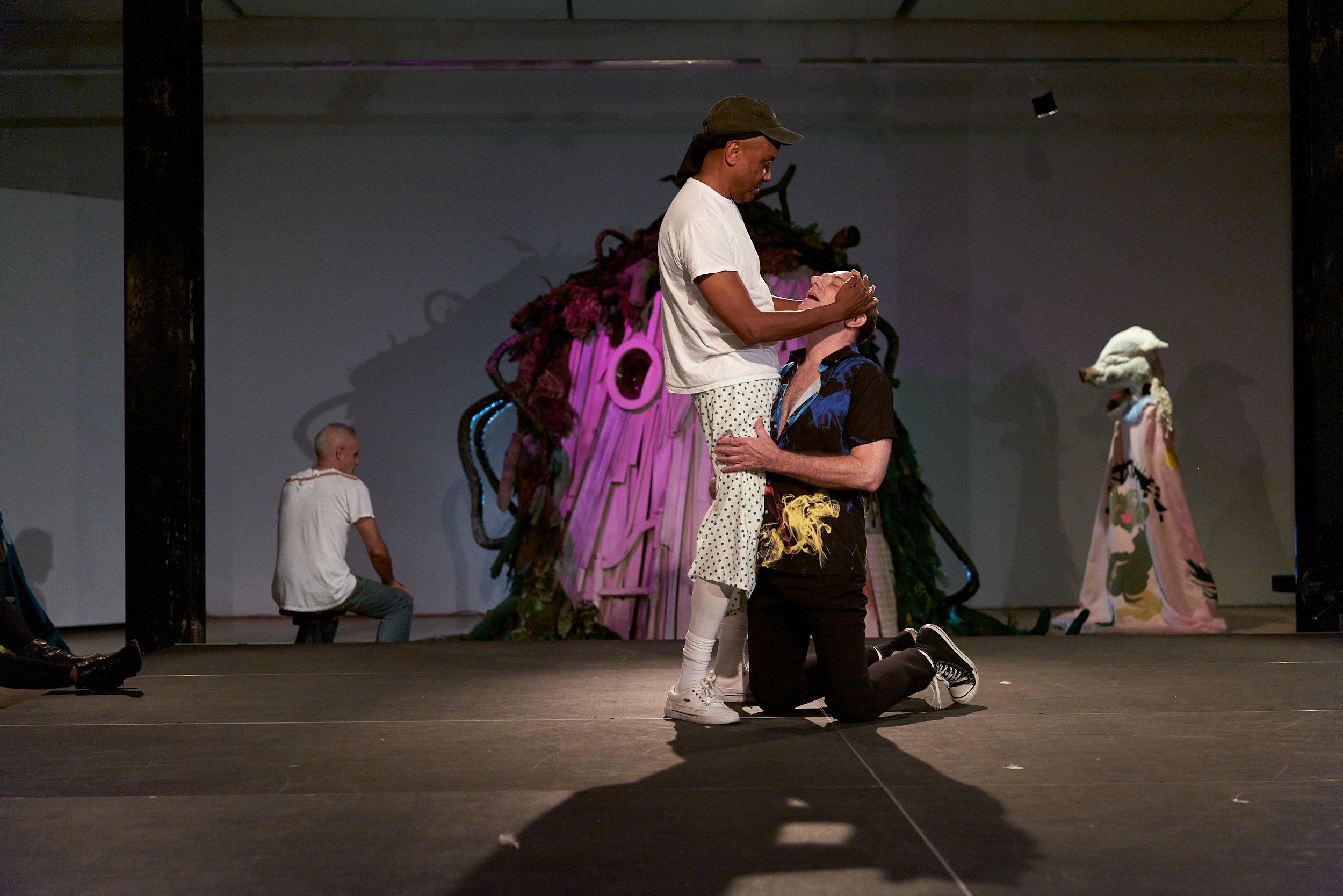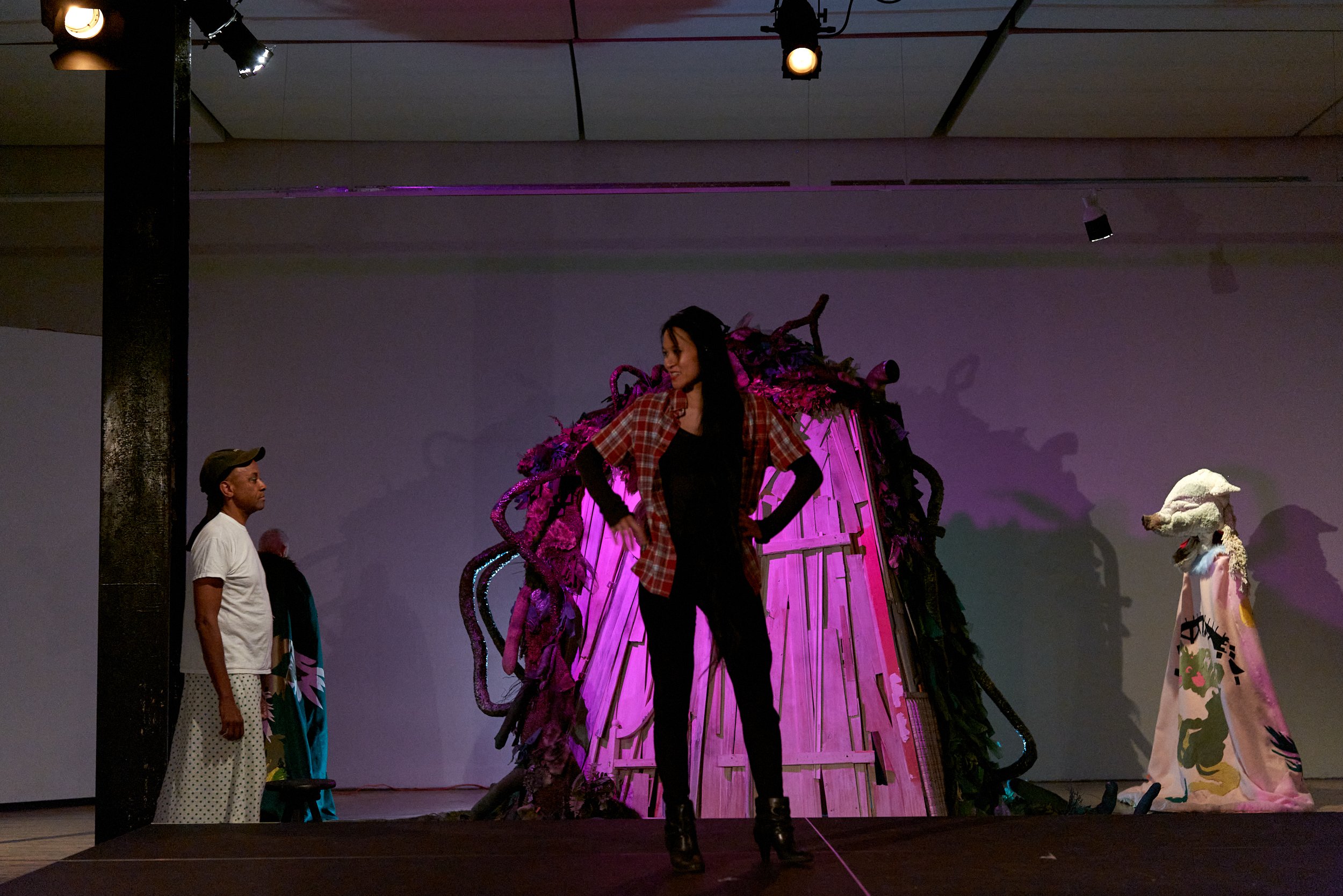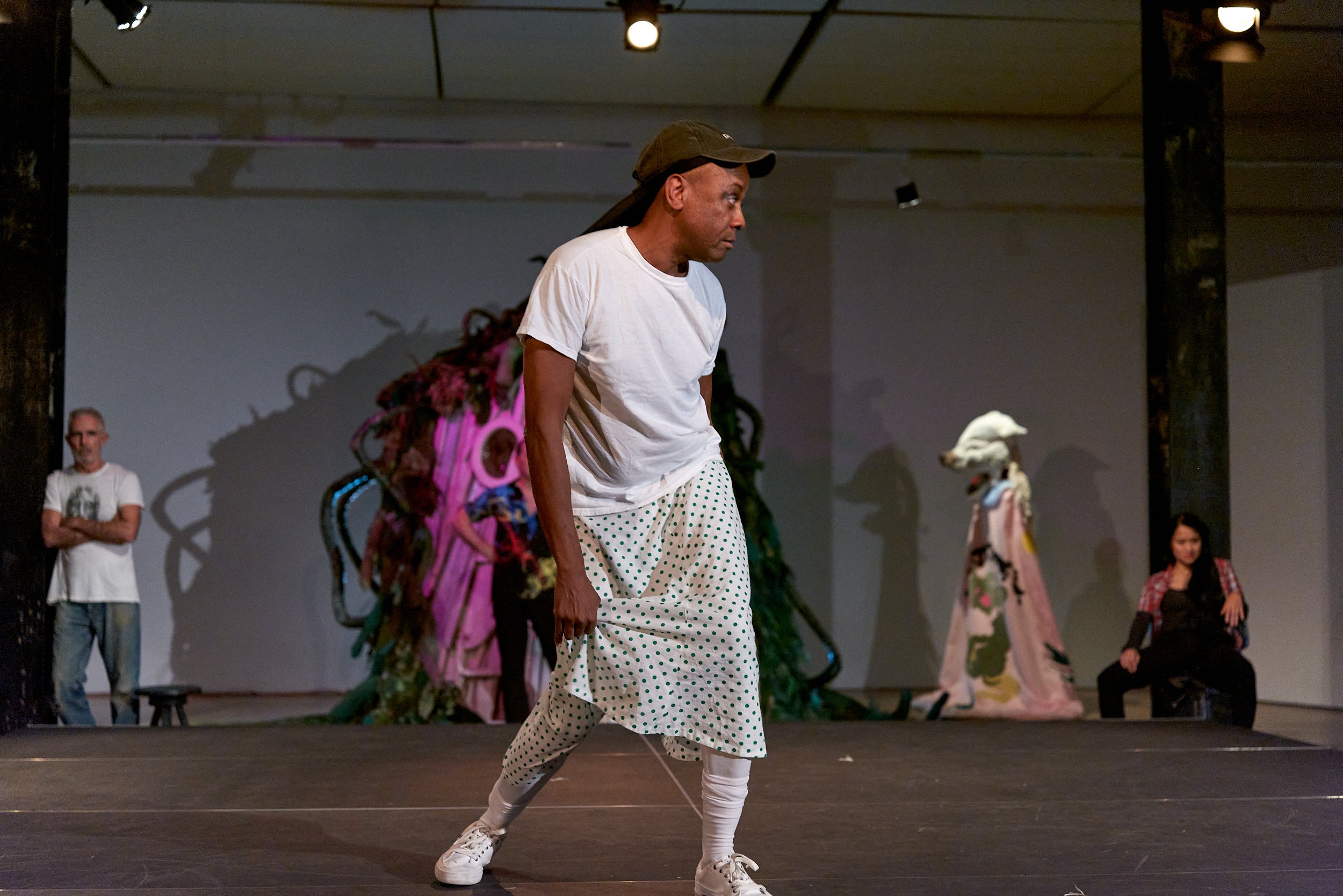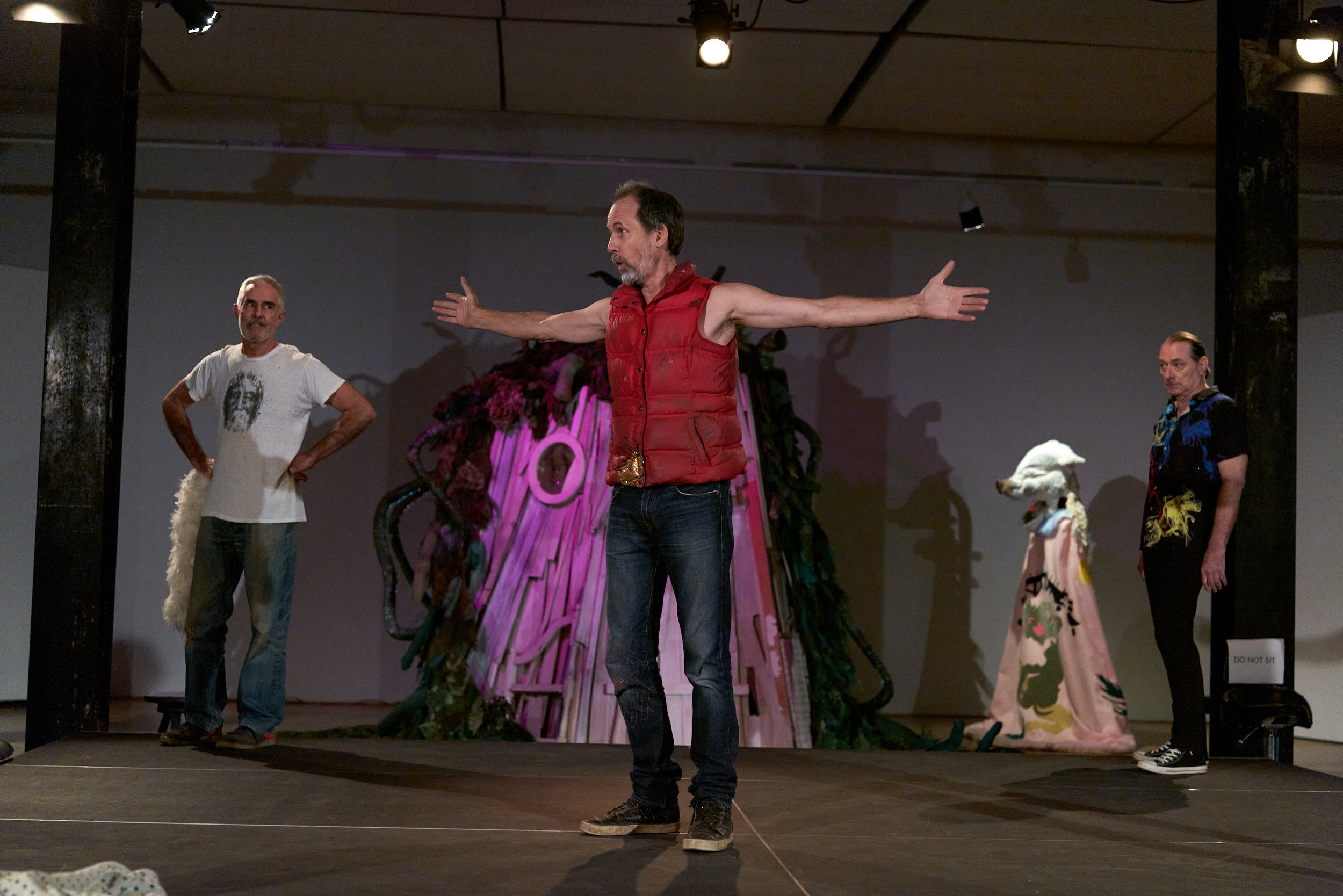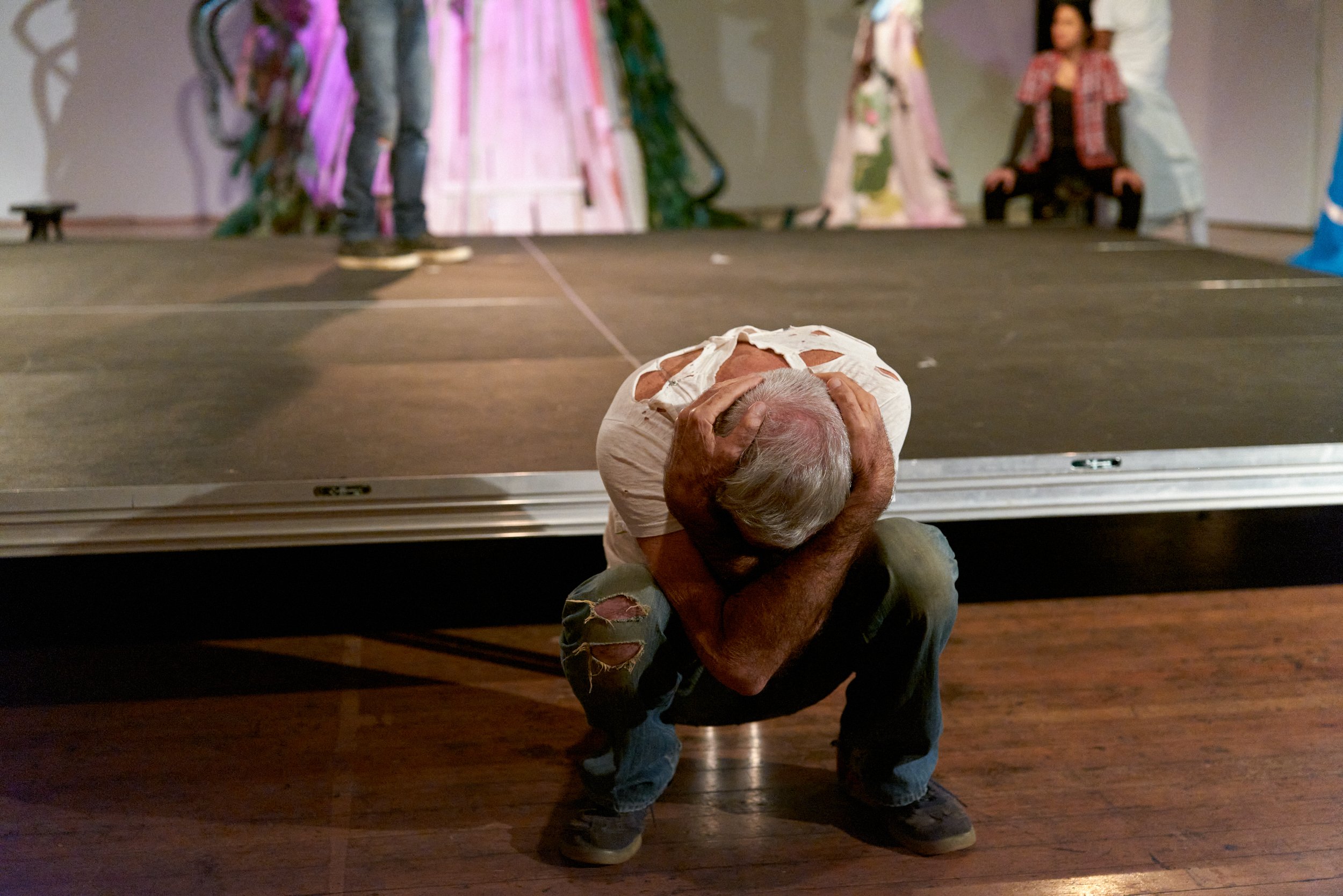













It's Better to Start Out Ugly
It's Better to Start Out Ugly
IT’S BETTER TO START OUT UGLY at Joan, aug 4,5,6
José Luis Blondet at Tony Sebastiano in “It’s Better to Start Ugly,” at The Lab, San Francisco, May 18-20, 2023
Asher Hartman and Gawdafful National Theater present a “no time for oblivion” thirst trap for queer psychosis, aging and dementia, fascistic white gay nuttery, near ventriloquism, fake theater and untranslatable gut goo of buried antipathies neatly played out on a hairy stage. Starring red hot actors and aesthetes José Luis Blondet, Michael Bonnabel, and Philip Littell, and written and directed by miniature puppeteer Asher Hartman, this 90-minute slippery ghost town of a play promises to leave you shaking your head at the nearest wine bar and taqueria.
It’s Better to Start Out Ugly began with the stories of two characters, Alfred and John, from Hartman’s 2019 traveling play The Dope Elf. Alfred and John are two gay white men living in dire financial circumstances on the edges of Los Angeles’ society. Once celebrated and handsome, they are struggling now. John, a former hustler, sells stolen goods on the street, hooks occasionally, and Alfred, an agoraphobic, stays inside. The couple live below their landlord, whom we never see, who shits on them from above.
Retreating into their couple’s games of violence and domination, John and Alfred imagine that they control a family of people they fear are gangsters living below. Alfred fantasizes a relationship with a Latinx boy, innocent and devoted to God, who sleeps next door. Meanwhile, another man, a “foreigner”--sometimes Spanish, sometimes Italian, but maybe neither--Sebastiano, wanders their apartment. They suddenly see each other, and the play lunges toward a psychedelic dementia-dream of hundreds of dead, victims and victimizers, ghosts of their emotional-political forebears, poisoners and agents of liberation active and alive inside them.
“You will not replace us!’ is a white supremacist cry borrowed from gay French author Renaud Camus’s book of the same name and his Great Replacement Theory. The men in this absurdist play, once beautiful, are now outcasts in what they perceive as their culture, competing for power, inhabited by the psychological residue of their shadow histories. Lust becomes the power to eat, to love, to consume the body of another, to release oneself in an erotic death. Influenced by Klaus Theweleit’s two-part volume on the psyches of fascist soldiers, Male Fantasies, and Jasbir Puar’s theories of homonationalism and queer exceptionalism, the play uses slapstick and other comedic abstractions to look at the complications of racism and white supremacy in gay communities, but also at the human pleasure in consumption that underscores our violence, thinking about dementia, aging, and the dream space as vehicles to unlock our tightly guarded unconsciousness material.
90 minutes with no intermission
Assistant Direction, Zut Lorz
Set and costume design, Brian Getnick
Sound design, Jasmine Orpilla
Lighting design, Chu-Hsuan Chang,
Graphic design, Jinha Song
Still photography, Ian Byers-Gamber
Videography for JOAN, Justin Streichman
Read Martin Harries review “Having Once Been Beautiful,” Los Angeles Review of Books, September 6, 2023.

The Dope Elf: Organized Around the Erotics of Doing You in
The Dope Elf: Organized Around the Erotics of Doing You in
THE dope elf: Organized around the erotics of doing you in
THE LAB, SAN FRANCISCO 2021
Disavowal, disgust, dissociation, delectation and death, the slime nectar of change, are the material of a performance that teeters between a theatrical work and a vigil for theater that can no longer hold our grief. Five actors from the original production of The Dope Elf able to travel during the pandemic convene to eat the sick body of their sprawling film and performance series, a satiric trek through the ordinary enactments of white supremacy, power, and delight in harm. Select parts are of the body are chosen. The belly, the groin, and the armpit are consumed in an agreement to tear at the gelatinous surface that protects actor from character. Asking “Why theater now?” Gawdafful National Theater allows for the seepage of the actors’ lived experience into the theater company’s rehearsed text, risking a theatrical experience that cannot be contained.
Joe Seely. Photo by Deanna Hubartt
Paul Outlaw and Jasmine Orpilla. Photo by Deanna Hubartt.
Michael Bonnabel, Philip Littell, Jasmine Orpilla, Paul Outlaw, and Joe Seely at The Lab.
All Photos by Deanna Hubartt. The Dope Elf house by Trulee Hall. Robes by Brian Getnick with Nikii Henry. Stands by Mathew Timmons.

The Dope Elf (2019/2020)
The Dope Elf (2019/2020)
THE DOPE ELF (2019-2021)
Elves, trolls, magicians, and infectious agents of Europe’s historical disease come to life in the form of ordinary American folk who inhabit a landscape of psychic pain set upon the structures of white supremacy and violence.

The Lost Privilege Company
The Lost Privilege Company
THE LOST PRIVILEGE COMPANY
Brian Getnick, Arne Gjelten, Tim Reid, and Asher Hartman (director) came together as The Lost Privilege Company in 2018 to interpret four poems from Blunt Research Group’s The Work-Shy. The Lost Privilege Company presented its performance at USC’s Brain and Creativity Institute in an evening of vivid performances by scholar and historian Miroslava Chávez-García, writer M. Nourbese Philip, literary history Caleb Smith and poet and scholar Daniel Tiffany. The Company is currently working on a full length performance for 2020-2021.

Sorry, Atlantis: Eden's Achin' Organ Seeks Revenge (2017)
Sorry, Atlantis: Eden's Achin' Organ Seeks Revenge (2017)
SORRY, ATLANTIS: EDEN'S ACHIN' ORGAN
SEEKS REVENGE (2017)
In a troubled world not unlike our own, two lizard-men tumble from the sky to an abandoned jetty by the sea. Inhabited only by a sad sack Psyclops, a satanic bird, and a sexy snail, the jetty becomes a raunchy boys' room, an Edenic dope yard of pleasure and sick until one day... Daddy's home. Soon hazy memories of war, incest, and a parricide fracture the minds of gods and animals and the humans cloaked within them.
All about Sorry, Atlantis: Eden's Achin' Organ Seeks Revenge

The Silver, the Black, the Wicked Dance (2016)
The Silver, the Black, the Wicked Dance (2016)
THE SILVER, THE BLACK, THE WICKED DANCE (2016)
Visually spare, brutally comic, and deeply layered in sound and text, The Silver, the Black, the Wicked Dance is a dark, comedic play about predation in American life. The tar pits, the Great Plains, and an imagined outer space are cold and silent landscapes upon which the euphoric drive to create others as foreign and to become foreign to oneself circulates in abstract vaudevilles of organ regeneration, alien acceptance, and depersonalization. The text, written by Asher Hartman through the work of the company, draws on historical and philosophical material, popular culture, and an extended dialogue with the company about the origins of and interest in shame among privileged populations in the 21st century.

Mr. Akita (2015)
Mr. Akita (2015)
MR. AKITA (2015, 2017)
Starring artist, comedian, and performer Cliff Hengst, Mr. Akita is a one man play in which a Borscht Belt comedian and an op-art painting, Sunburn by Emily Joyce, go "head to surface" in a reminiscence of love, sex, art, failure and the sublime.

Purple Electric Play (2014)
Purple Electric Play (2014)
PURPLE ELECTRIC PLAY (2014)
In a mix of black light theater and black magic, Purple Electric Play (PEP!) follows two underground entertainers, THE VITAL ORGAN (Jasmine Orpilla and Kalean Ung) and THE STAR (Philip Littell), as they step in and out of rough and ridiculous political histories, assisted by their pals, THE AUDIENCE (Joe Seely), four naive and playful puppets, LO-PHAT, DONKEY, SALAD BAR and STARVATION (Drew Thatausie and Chelsea Rector) luring their live audience deeper into the morass of questions and confrontations that arise from memories on injustice and revolt. PEP! explicitly leverages an audience's expectation of diversion and excitement to explore the relationship of the creative class to privilege and power, both as resistors and provocateurs.

Glass Bang (2013)
Glass Bang (2013)
GLASS BANG (2013)
Gavin Rose (Paul Outlaw) comes home from a long journey to find his house sitters Evan (Michael Morrissey) and Byron (Franc Baliton) have taken his furniture, redecorated, and are living with a barfly, Brian, in his now unrecognizable home. They throw a party for his return, inviting his ex-wife, Cheyenne (Rochelle Fabb), and twenty strangers. During the course of the evening, one of the house sitters, Byron, slowly becomes a bird-god, altering the course of the evening from cocktails to an interweaving of subtexts around money, class, possession and murder.

See What Love The Father Has Given Us (2012)
See What Love The Father Has Given Us (2012)
SEE WHAT LOVE THE FATHER HAS GIVEN US (2012)
See What Love The Father Has Given Us is a religio-dramedy about three big box store employees who travel through tiers of reality taking on aspects of the Holy Trinity. The piece looks at the ways in which the triad and the Trinity influence the way we love in the Western world. Audiences enter through a dark hallway leading into two triangular rooms-an idyllic garden and an employee break room. Viewers follow the action as it moves from room to room and are always extremely close to the performers who shift from the heightened language of the Other World to the indifferent speech of the present, from supreme beings to human beings.

The All Stars of Non Violet Communication (2011)
The All Stars of Non Violet Communication (2011)
THE ALL STARS OF NON VIOLET COMMUNICATION (2011)
Loosely inspired by the lives of Paul Lynde (Michael Morrissey), Charles Nelson Reilly (Joe Seely), Barclay Shaw (Patrick Kennelly) and Wayland Flowers (Franc Baliton), The All Stars of Non Violet Communication takes its cues from the moment in a stand up routine when the comedian turns against the audience, heaping savagery upon them in an attempt to defend the comic's role as container and messenger of a society's unacknowledged debts and burdens.

Annie Okay (2010)
Annie Okay (2010)
ANNIE OKAY (2010)
An original performance theater work, Annie Okay is inspired by the unintentional colonialist subtext in two of America's most beloved musicals, Annie Get Your Gun and The King and I. The piece revisists the musical form to look at what our entertainments say about our struggle with race, identity, colonialist politics, and the American tryst with violence. Poetic, dense, funny and complicated, Annie Okay challenges and surprises audiences as they are led through the Hammer Museum's expansive lobby and marble terraces following a conceptual narrative performed by Los Angeles-based performance artists and actors. The performance moves between abstract theater, comedy and relational components that allow audiences to enter into dialogue drawn from the piece's mix of ragged humor, violence, and sexuality.

Bad Thing (2010)
Bad Thing (2010)
BAD THING (2010)
Nasty, poetic, and surprisingly funny, Bad Thing is an amalgamation of theater, installation, performance and painting. The piece circles around the body of American violence, exploring ideas of Western guilt and pleasure in a series of shifting scenarios that are often grotesquely humorous, sometimes tender, always distressingly familiar. This dark performance features six characters (a hallucinating conquistador, a brutally sadistic monk, a paranoid hidalgo, a grotesquely obsequious servant, and Jesus Christ in the guise of a fox, and six paintings that explore and complicate archetypal themes of dominance, submission, boredom, paranoia, and transcendence. Bad Thing takes inspiration from 17th century Spanish playwright Lope de Vega's story of a repentant sadistic noble La Fianza Satisfecha, the diaries of Spanish conquistador-turned-healer Cabeza de Vaca, and Eduardo Galeano's classic Open Veins of Latin America.
